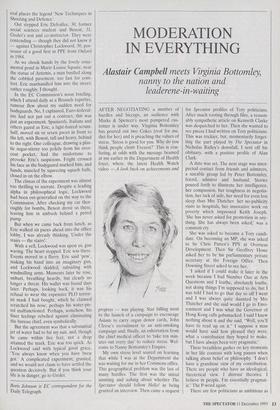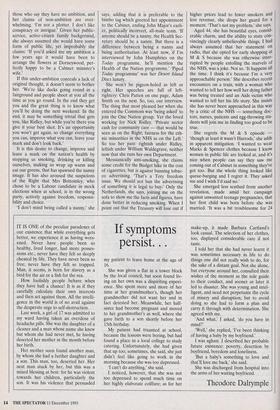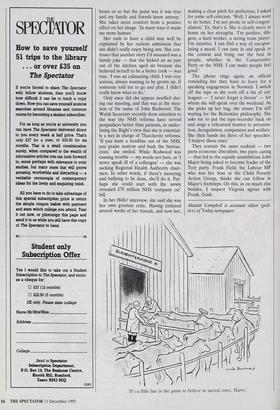MODERATION IN EVERYTHING
Alastair Campbell meets Virginia Bottomley,
nanny to the nation and leaderene-in-waiting
AFTER NEGOTIATING a number of hurdles and hiccups, an audience with Marks & Spencer's most pampered cus- tomer is under way. Virginia Bottomley' has poured out two Cokes (real for me, diet for her) and is preaching the values of stress. 'Stress is good for you. Why do you think people climb Everest?' This is con- fusing, at odds with the message beamed at me earlier in the Department of Health foyer, where the latest Health Watch video — A look hack on achievements and
progress — was playing. Star billing went to the launch of a campaign to encourage Asians to carry organ donor cards, John Cleese's recruitment to an anti-smoking campaign and, finally, an exhortation from the chief medical officer to 'take ten min- utes out every day' to reduce stress. Wel- come to Nanny Bottomley's Empire.
My own stress level soared on learning that while I was at the Department she was waiting for me in her Commons office. This geographical problem was the last of many hurdles. The first was the initial umming and aahing about whether The Spectator should follow Hello! in being granted an interview. Then came a request for Spectator profiles of Tory politicians. After much rooting through files, a reason- ably sympathetic article on Kenneth Clarke was despatched to her. Then she wanted to see pieces I had written on Tory politicians. This was trickier, but, momentarily forget- ting the part played by The Spectator in Nicholas Ridley's downfall, I sent off his obituary, with a positive profile of Alan Clark.
A date was set. The next stage was unex- pected contact from friends and admirers, a sizeable group led by Peter Bottomley, friend, admirer and husband. Stories poured forth to illustrate her intelligence, her compassion, her toughness in negotia- tion, her lack of side, her need for even less sleep than Mrs Thatcher, her no-publicity visits to hospitals, her innovative work on poverty which impressed Keith Joseph. `She has never asked for promotion in any- thing. She has always been asked,' was a common cry.
She was asked to become a Tory candi- date. On becoming an MP, she was asked to be Chris Patten's PPS at Overseas Development. Then Sir Geoffrey Howe asked her to be his parliamentary private secretary at the Foreign Office. Then Downing Street asked to see her.
`I asked if I could make it later in the week because I had Number One at Arts Questions and I loathe, absolutely loathe, not doing things I'm supposed to do, but I was told I had to go that day so off I went and I was always quite daunted by Mrs Thatcher and she said would I go to Envi- ronment and I was what the Governor of Hong Kong calls gobsmacked. I said I knew nothing about it and she said, "Well, you'll have to read up on it." I suppose a man would have said how pleased they were, what a contribution they hoped to make, but I have always been very pragmatic.'
These breathless gushes on key moments in her life contrast with long pauses when talking about belief or philosophy. 'I don't have a grandiose view of my contribution. There are people who have an ideological, theoretical view. I distrust theories. I believe in people. I'm essentially pragmat- ic.' The P-word again.
There are few politicians as ambitious as those who say they have no ambition, and her claims of non-ambition are over- whelming. 'I'm not a plotter. I don't like conspiracy or intrigue.' Given her public- service, active-citizen family background, she always assumed she would have some . form of public life, yet improbably she claims: `If you'd asked me my ambition a few years ago it would have been to arrange the flowers at Dorneywood, per- fectly happy to be a Cabinet minister's wife.'
If this under-ambition conceals a lack of original thought, it doesn't seem to bother her. 'We're like ducks going round in a fairground and people shoot at you all the time as you go round. In the end they get you and the great thing is to know what you'll be doing the next weekend. In the end, it may be something trivial that gets you, like Ridley, but while you're there you give it your best shot. It's an opportunity you won't get again, so change everything you can, improve what you can, leave your mark and don't look back.'
It is this desire to change, improve and leave a mark on the nation's health by stopping us smoking, drinking or killing ourselves, making us wrap up warm and eat our greens, that has spawned the nanny image. It has also aroused the suspicions of the Right that Mrs Bottomley, who chose to be a Labour candidate in mock elections when at school, is in the wrong party, actively against freedom, responsi- bility and choice.
`I don't mind being called a nanny,' she says, adding that it is preferable to the bimbo tag which greeted her appointment to the Cabinet, ending John Major's earli- er, politically incorrect, all-male team. 'If anyone should be a nanny, the Health Sec- retary should be a nanny. But there is a difference between being a nanny and being authoritarian. At least now, if I'm interviewed by John Humphries on the Today programme, he'll mention the Health of the Nation programme.' Piped Today programme' was her Desert Island Discs luxury.
She won't be pigeon-holed as left or right. Her speeches are full of left- rightery: Chris Patten on one page, Adam Smith on the next. So, too, our interview. The thing that most pleased her when she entered the Commons was 'being asked' to join the One Nation group. Yet she loved working for Nick Ridley. 'Private sector cash for community care — that would be seen as on the Right; fairness for the eth- nic minorities in the NHS as on the Left.' So too her past: rightish under Ridley, leftish under William Waldegrave, neither now that she runs her own Department.
Messianically anti-smoking, she claims some credit for the Budget hike in the cost of cigarettes, but is against banning tobac- co advertising. 'That's a Tory freedom issue. We should not ban the advertising of something it is legal to buy% Only the Netherlands, she says, joining me on the sofa to show me the facts and figures, have done better in reducing smoking. When I point out that the Treasury will lose out if
higher prices lead to fewer smokers and less revenue, she drops her guard for a moment. 'That's not my problem,' she says. Aged 44, she has beautiful eyes, consid- erable charm, and the ability to state con- vincingly clearly unbelievable things. I had always assumed that her statement on radio, that she opted for early shopping at M & S because she was otherwise inter- rupted by people extolling the marvels of the NHS, was a joke. Not so. 'It happens all the time. I think it's because I'm a very approachable person.' She describes recent encounters on a train, with a woman who wanted to tell her how well her dying father was being treated and an Aids victim who wanted to tell her his life story. She insists she has never been approached in this way by a critic of the NHS — something doc- tors, nurses, patients and egg-throwing stu- dents will join me in finding too good to be true.
She regrets the M & S episode — `though at least it wasn't Harrods,' she adds in apparent mitigation. 'I wanted to wear Marks & Spencer clothes because I know women in public life are looked at, and it's nice when people can say they saw me coming out of Cabinet in something they've got too. But the whole thing looked like queue-barging and I regret it. They asked me and I wish I'd said no.'
She emerged less scathed from another revelation, made amid her campaign against unwanted teenage pregnancies, that her first child was born before she was married. 'It was a bit troublesome for 24 hours or so but the point was it was true and my family and friends knew anyway.' She takes more comfort from a positive effect on her image. 'In many ways it made me more human.'
Her rush to have a child may well be explained by her curious admission that she didn't really enjoy being one. She con- fesses that another story I'd assumed was a family joke — that she kicked an au pair out of the kitchen aged six because she believed herself to be a better cook — was true. 'I was an exhausting child. I was very serious, always wanting to be grown up. If someone told me to go and play, I didn't really know what to do.'
Only once did she appear needled dur- ing our meeting, and that was at the men- tion of the name of John Redwood. The Welsh Secretary recently drew attention to the way the NHS reforms have served penpushers better than patients, so under- lining the Right's view that she is essential- ly a wet in charge of Thatcherite reforms. `If you want a headline out of the NHS, you praise matron and bash the bureau- crats,' she smiled. While Redwood was causing trouble — my words not hers, as 'I never speak ill of a colleague' — she was sacking Regional Health Authority chair- men. In other words, if there's nannying and bullying to be done, she'll do it. Per- haps she could start with the newly revealed £70 million NHS 'company car' bill.
In her Hello! interview, she said she was her own greatest critic. Having endured several weeks of her friends, and now her, making a clear pitch for perfection, I asked for some self-criticism. 'Well, I always want to do better. I'm not prone to self-congrat- ulation.' Er, that's it. She is clearly more at home on her strengths. 'I'm positive, dili- gent, a hard worker, a strong team player. I'm intuitive. I can find a way of encapsu- lating a mood. I can tune in and speak to the context and bring out the best in people, whether in the Conservative Party or the NHS. I can make people feel good.'
The phone rings again, an official reminding her they have to leave for a speaking engagement in Norwich. I switch off the tape as she reels off a list of col- leagues — 'I never forget a favour' — for whom she will speak over the weekend. As she picks up her bag, she senses I'm still waiting for the Bottomley philosophy. She asks me to put the tape-recorder back on and sings a rehearsed mantra to privatisa- tion, deregulation, compassion and welfare. She then hands me three of her speeches. 'I believe those ones.'
They contain the same cocktail — two parts economic liberalism, two parts caring — that led to the equally unambitious John Major being asked to become leader of the Tory party. Frank Field, the Labour MP who was her boss at the Child Poverty Action Group, thinks she can follow in Major's footsteps. On this, as on much else besides, I suspect Virginia agrees with Frank. Gosh.
Alastair Campbell is assistant editor (poli- tics) of Today newspaper.
'It's a little late in the game to believe in sacred cows, Harry.'




































































 Previous page
Previous page